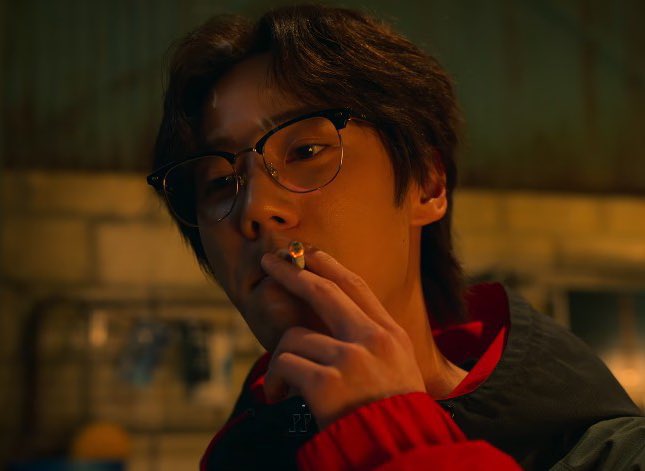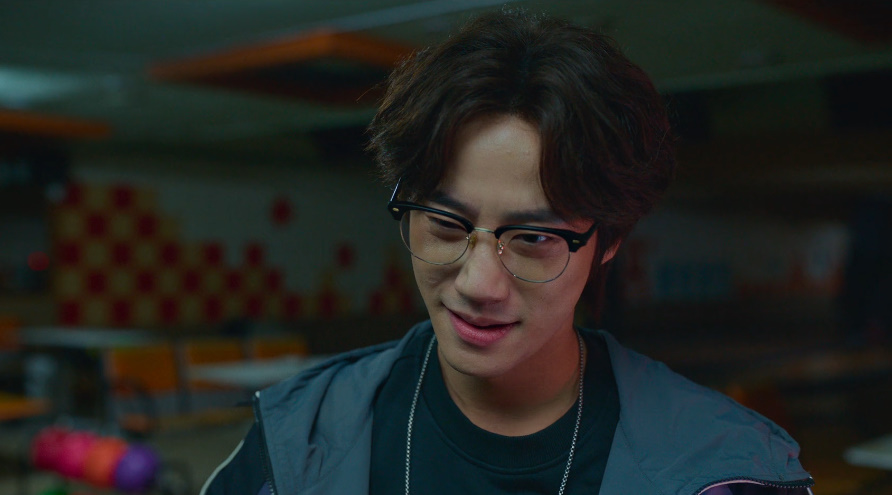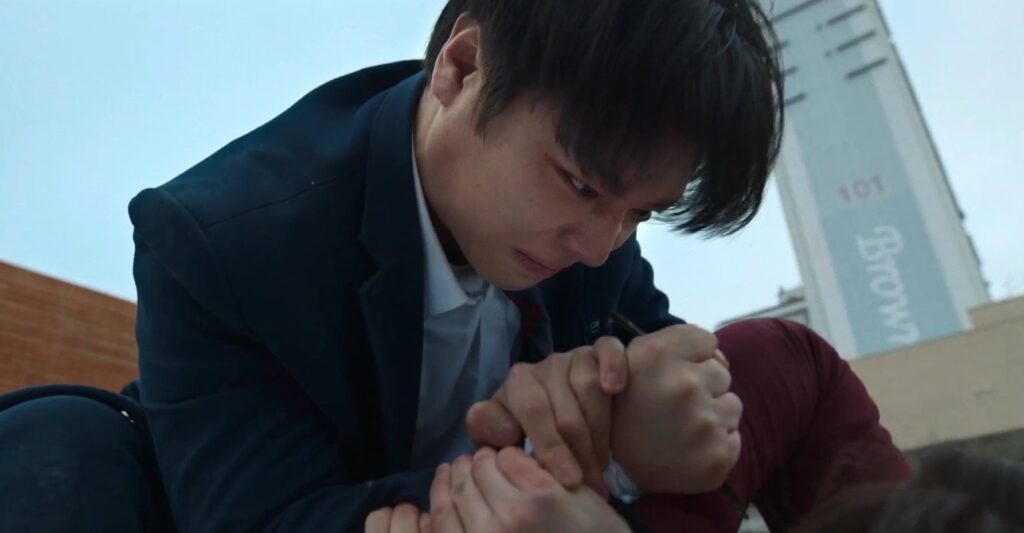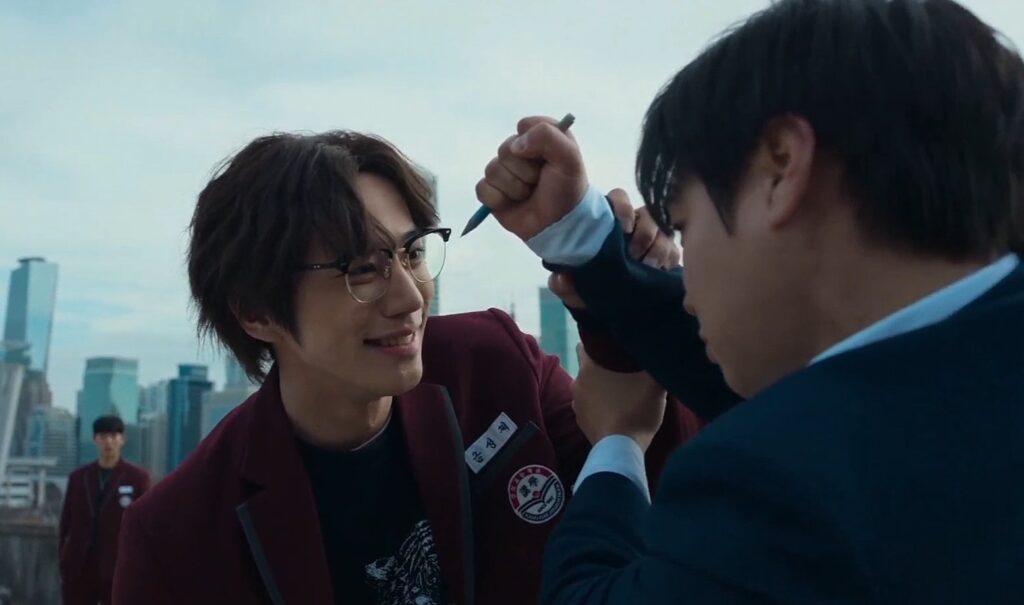📍 Posted on June 14, 2025 | By JennieLee | Category: Weak Hero Analysis
When a Special Guest Star Made Everyone Stop and Stare
When Weak Hero Class 2 introduced Geum Seong-je, portrayed by Lee Jun-young, the series didn’t simply add another school antagonist. Instead, viewers encountered a character so magnetically chaotic and impossibly complex that he instantly became the season’s most captivating presence. Even the cast unanimously declared him “sexy” during their group screening—a testament to the raw magnetism Lee Jun-young brought to this role.
The question that emerges naturally: what makes Seong-je so compelling? The answer lies in understanding that Seong-je represents something rarely seen in school violence dramas: a romantic living in a world with no space for romance.
📢 Fair Use Notice This analysis contains copyrighted material from “Weak Hero Class 2” (© Wavve/Netflix) used for educational criticism and commentary under fair use doctrine. All rights belong to original creators.
His Name Says It All
Let’s break down Seong-je’s name because it’s pretty telling. “Geum” (금) means “metal” or “gold”—you know, strength and value. “Seong” (성) means “success,” and “Je” (제) means “emperor” or “ruler.” Put it all together and you basically get “Golden Success Emperor.” That’s a name with some serious weight behind it.
In the original webtoon, they call him the “Strong Tyrant,” and international fans just call him “Wolf.” These aren’t just cool nicknames—they show us this character was built to be powerful and unpredictable. But here’s where it gets interesting: this “emperor” moves through the world in the loneliest way possible.

Wait—Let’s Talk About Seong-je’s “Romantic” for a Sec
Before we dive deeper, we need to understand what Seong-je means when he talks about being “romantic” (낭만/NangMan in Korean). This isn’t your typical romantic comedy romance. The Korean word “낭만” carries way more layers than the English translation can capture.
When Seong-je uses “NangMan,” he’s packing in all these vibes: innocence, naivety, childlike fun, uncalculated enjoyment—basically everything pure and spontaneous that the adult world tries to crush out of you. When he tells Jun-tae about “Nang Man Hap Kyeuk” (romantic union), he’s actually talking more about “naivety” than romance in the lovey-dovey sense.

“Nang Man Hap Kyeuk”
The Lone Wolf Who Doesn’t Need a Pack
The most fascinating thing about Seong-je? He “stubbornly walks alone” even though he’s part of the Union. This isn’t just teenage rebellion—it’s who he is at his core.
When Seong-je gets interested in Si-eun and Jun-tae’s friendship, he’s not trying to join them. He’s just fascinated by something he doesn’t get: real human connection. Does Seong-je need friends?
Nope. He needs excitement.
The Union’s Fake Gangster Vibes
Seong-je clearly can’t stand anyone in the Union except Na Baek-jin. He sees right through their “gangster cosplay” and knows they’re just “thugs with no sense of romance.” These guys aren’t real criminals with honor codes—they’re just bullies playing dress-up, and Seong-je’s disgust with their fake act is so obvious.
His motto, “Don’t talk to me if you don’t want to get beaten up,” isn’t really about scaring people. It’s about keeping boundaries. He’s protecting himself from all the boring people around him while he waits for something actually interesting to show up.

“Don’t talk to me if you don’t want to get beaten up”
The Dopamine Junkie’s Never-Ending Hunt
Lee Jun-young’s performance shows us something crucial: Seong-je is completely hooked on dopamine. Every single scene with him shows him looking for his next fix—gaming, scrolling on his phone, smoking, fighting. He doesn’t just like fighting; he’s obsessed with it. This isn’t about being sadistic in the usual way—it’s about desperately searching for anything that can make him feel alive in a world that keeps letting him down.
This addiction explains why he’s immediately drawn to Si-eun. When Seong-je says Si-eun has “sad eyes” and later says he “looks like he’d be fun to beat up,” he’s not just being mean. He’s picking up on something in Si-eun that promises real excitement—someone who might actually give his dopamine-starved brain the challenge it’s craving.

The Rooftop Fight: Peak Performance
The rooftop confrontation between Si-eun and Seong-je represents the series’ absolute peak precisely because it delivers on this promise. Seong-je’s fighting awareness proves incredible, but more compelling is his tactical intelligence. After noticing Si-eun’s exceptional dynamic vision during their bathroom encounter, he immediately incorporates this knowledge into their rooftop battle, using his palm to block Si-eun’s sight lines.
The most iconic Seong-je moment happens when Si-eun steals his glasses and stabs his foot with the temple piece. Any normal person would be pissed or shocked. Seong-je’s reaction? “This is it!” He actually giggles with joy while he keeps fighting.

“This is it!”
This scene goes beyond just character work—it shows off Lee Jun-young’s incredible acting range. The way he plays someone who’s so genuinely excited by pain and challenge that he can’t contain himself is both terrifying and weirdly charming.
This moment captures everything cool about Seong-je: he appreciates cleverness, he genuinely loves fighting, and he can find joy in situations that would mess up most people. He’s not fighting Si-eun because he has to—he’s fighting because Si-eun is finally giving him the experience he’s been looking for.
The Romantic’s Personal Code
What makes Seong-je truly fascinating involves his adherence to a personal romance code others cannot understand. When Si-eun calls for help and he appears to eat convenience store ramen, he’s not simply being helpful—he’s following his romantic notion of relationship dynamics.
The Beautiful Betrayal
His eventual betrayal of Si-eun to help Baek-jin is one of the series’ most puzzling character moments. Here’s the thing—we can’t really tell if Seong-je’s choice comes from some deep loyalty to Baek-jin or if it’s just a simple change of heart. When he ties Si-eun up at the bowling alley so Baek-jin can win the crucial fight, is he following some twisted code of honor? Or is he just being unpredictable because that’s who he is? The show leaves us guessing, which makes his character even more unsettling.
The brilliance lies in Seong-je’s self-awareness. He jokes about “becoming a good person” while helping Si-eun, then deliberately chooses remaining “the bad guy” because that proves more authentic. This isn’t moral flexibility; it’s moral consistency according to his bizarre ethical framework.

“I feel like I’m becoming a good person or something, but I just like things that are fun”
Lee Jun-young: The Perfect Synchronicity
Director Han Jun-hee’s decision to cast Lee Jun-young was genius when you understand the thinking behind it. As Lee Jun-young shared in interviews, the director told him: “You have to play Geum Seong-je. Geum Seong-je is exactly who you are.”
This wasn’t typecasting—it was recognizing perfect sync between actor and character. Lee Jun-young’s own romantic tendencies line up perfectly with Seong-je’s worldview. As he put it, “The romantic aspect that I, Lee Jun-young, have as a human being also exists in Geum Seong-je.”
Behind-the-Scenes Insights
Park Ji-hoon’s observations add another layer to understanding Lee Jun-young’s embodiment of the character. His description of being genuinely nervous during their bathroom fight scene because Lee Jun-young’s punches were so fast they made wind sounds shows the actor’s physical commitment. Even better, Park Ji-hoon noted that watching Lee Jun-young walk away after filming, hands in pockets, looked exactly like Seong-je—the character and actor had become the same person.

“You have to play Geum Seong-je. Geum Seong-je is exactly who you are.”
The Acting Philosophy Behind the Madness
Recent interviews reveal the sophisticated thought process behind Lee Jun-young’s choices. His eye acting approach demonstrates remarkable psychological insight. When observing Baek-jin, Seong-je’s eyes lose focus because he views him as “an opponent I could defeat anytime.”
But when looking at Si-eun, everything transforms. As Lee Jun-young explains, Si-eun represents “someone Seong-je wants to possess and conquer, but since he can’t have him, how frustrated must Seong-je be?” This frustration manifests in eyes that “have to go crazy”—perfectly describing the intense, almost manic way Seong-je stares at Si-eun throughout their interactions.

Someone Seong-je wants to possess and conquer, but since he can’t have him, how frustrated must Seong-je be?
The Perfect Storm of Visual Chemistry
The height difference between Lee Jun-young and Park Ji-hoon amplifies their relationship’s visual dynamics. Seong-je literally looks down at Si-eun, but rather than simple condescension, his expression carries slight smirks and genuine fascination. When most people break eye contact within three seconds of meeting Seong-je’s gaze, Si-eun stares directly back—and this fearlessness captures Seong-je’s interest precisely.
The power imbalance in their rooftop fight creates compelling tension. When Si-eun struggles with both hands to hold his pen weapon, Seong-je casually restrains him with one hand. Yet Si-eun’s victory comes through intelligence rather than strength—a perfect metaphor for their entire dynamic: brute force versus cunning, chaos versus calculation.

“What? You gonna stab me with that?”
The Philosophy of a Beautiful Monster
Seong-je represents something rarely seen in school violence dramas: a villain who genuinely appreciates conflict artistry. He doesn’t simply want victory; he wants to be impressed. When Si-eun outsmarts him, Seong-je’s delighted response reveals someone valuing cleverness over dominance, entertainment over control.
This skill appreciation extends to his view of Union members versus characters like Si-eun and Jun-tae. After spending time with “wannabe gangsters with no sense of romance,” encountering genuinely interesting people must feel like discovering water in a desert.

What ultimately makes Seong-je compelling involves his role as romantic anarchist in a world of petty politics and false hierarchies. While others play social dominance games, Seong-je operates according to authentic experience and genuine emotion principles. He helps Si-eun when it feels romantic, then betrays him when Baek-jin loyalty takes precedence.
What’s notable about Seong-je is how consistently he follows his own internal logic. When he decides to “remain the bad guy,” there’s a disturbing honesty to it—he doesn’t seek redemption or justify his actions, just commits to his chosen path.
This consistency makes him compelling as an antagonist. His unwavering commitment to a destructive identity feels psychologically realistic compared to characters who constantly waver between moral extremes. It’s not that his choices are right—it’s that his commitment feels authentically human, even when it leads somewhere dark.
Discussion Questions
What do you think about Seong-je’s character development? Do you find his romantic anarchist philosophy compelling or disturbing? Would you want to see him return in future seasons? Share your thoughts about this complex antagonist in the comments below.
🔗 Related Posts by Character & Language
📚 Si-eun (시은) Analysis
English Posts
- Si-eun’s Episode 8 Revenge: Why the “Implausible” Critique Completely Misses the Point
- Why Si-eun is a Character Magnet: The Psychology Behind Weak Hero’s Most Compelling Relationships
- Si-eun’s Hidden Violence: An Exploration
- Si-eun’s Revenge Debate: Core Fan Comments Compilation
🥊 Su-ho (수호) Analysis
English Posts
- Su-ho’s Lost Comedy Gold: The Wordplay That Made Weak Hero Fans Fall in Love (But English Subtitles Missed Everything)
- The Untold Story of Su-ho and Beom-seok: Why Their Friendship Was Doomed from the Start
Korean Posts
💔 Beom-seok (범석) Analysis
English Posts
- When Dreams Become Prison: Analyzing Beom-seok’s Boxing Ring Appearance in Si-eun’s Dreams
- When Subscribers Become Psychology Experts: Two Brilliant Takes on Why Beom-seok Destroyed Su-ho in That Ring
- Beom-seok’s Obsession with Su-ho: The Tragic Psychology Behind Weak Hero’s Most Complex Relationship
⚡ Seong-je (성제) Analysis
English Posts
🤝 Character Dynamics
English Posts
- Su-ho and Si-eun’s Relationship: When Fans Ask the Hard Questions About Weak Hero’s Most Debated Bond
- Understanding Yeong-i: The Character Who Reveals Everything About Weak Hero’s Heart
- Was Yeong-i Added to Tone Down the Bromance? When Subscribers Drop Literary Masterpieces in My Comments
- Jun-tae’s Japanese Mystery and the Heartwarming Go-tak Friendship in Weak Hero Class 2
🎭 Behind-the-Scenes & Analysis
English Posts
- Weak Hero Class 1 Script Book: Behind-the-Scenes Secrets That Will Change How You See the Show
- Script Book vs Final Cut: The Dream Scene That Made Us All Cry
- The Complete Behind-the-Scenes Story of Weak Hero Class 1 – Answering Subscriber Questions
- Weak Hero Class Change Video Explanation: Actors Switching Roles
- Weak Hero Deleted Scene Delivery! Beuksan High’s #1 Taking Down Bullies
🌍 Fan Community & Cultural Analysis
English Posts
- Weak Hero Fans Are Going INSANE and I’m Here for It: The Comments That Broke My Brain
- The Joy of Global Connection: Discussing Weak Hero’s Most Complex Relationships with Fans Around the World
- When International Fans Decode Korean Bromance: Why Weak Hero Reads as BL Overseas
- Three Questions That Reveal Weak Hero’s Hidden Korean Realism
- Why These Three Friends Always Sit Together During Exams (And Other Translation Secrets)
Korean Posts
📊 Quick Navigation by Interest
⚡ Character Dynamics:
- Su-ho and Si-eun’s Relationship
- Beom-seok’s Obsession with Su-ho
- When International Fans Decode Korean Bromance
🧠 Psychology Deep Dives:
- When Subscribers Become Psychology Experts
- Si-eun’s Episode 8 Revenge
- Why Si-eun is a Character Magnet
🎬 Behind-the-Scenes Content:
🌐 Translation & Cultural Context:
Site Policies & Legal Information
✅ About JennieLee’s K-Drama Analysis This blog provides personal fan analysis and critical commentary on Korean dramas, specializing in psychological character studies and cultural context. All content represents individual interpretations from an analytical perspective, unaffiliated with official production teams or distributors.
⛔️ Copyright Disclaimer All drama footage, images, and references belong to their respective copyright holders, including Wavve, Netflix, and original content creators. Materials are used minimally under fair use doctrine for educational criticism and analysis purposes only, with no intent of copyright infringement. This blog respects intellectual property rights and encourages viewers to support official releases.
🔒 Privacy Policy This site follows standard web privacy practices. We do not collect personal information beyond basic analytics for content improvement. Cookies may be used to enhance user experience. Any advertising displayed follows network privacy standards.
📧 Contact & Corrections For questions, concerns, or content corrections, please use the comment sections or contact forms provided. This is fan-created analytical content that respects all original copyrights. We are not responsible for losses or damages resulting from our interpretative content.
🎬 Content Ethics All analysis maintains respectful discourse about fictional characters and real actors. We do not engage in speculation about actors’ personal lives and focus solely on their professional performances and character portrayals.

답글 남기기